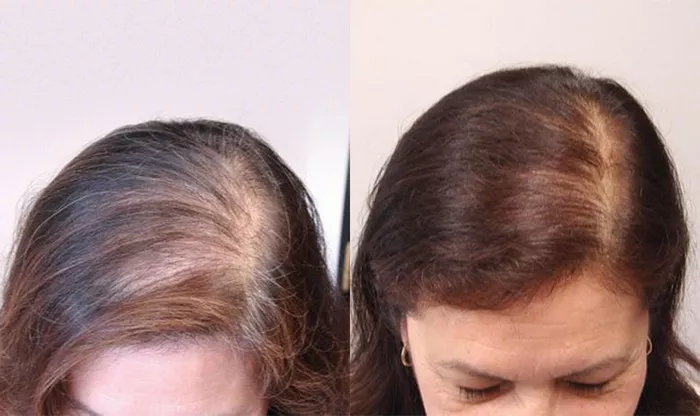Polycystic Ovary Syndrome (PCOS) is a hormonal disorder that affects millions of women worldwide. Among its various symptoms, hair loss is a common and distressing issue. Understanding the relationship between PCOS and hair loss, along with available treatment options, is crucial for managing this aspect of the condition effectively.
Explanation of PCOS
PCOS is a complex endocrine disorder characterized by hormonal imbalances, ovarian cysts, and metabolic irregularities. Women with PCOS often have higher levels of androgens, commonly known as male hormones, such as testosterone and its derivative, dihydrotestosterone (DHT). These hormonal imbalances can disrupt the menstrual cycle and lead to symptoms like irregular periods, infertility, weight gain, and hair loss.
Role of Hormones
Androgens play a significant role in PCOS-related hair loss. DHT, a potent form of testosterone, binds to hair follicles on the scalp, causing them to shrink and eventually stop producing new hair. This process, known as androgenic alopecia or female pattern hair loss, results in thinning hair on the crown and temples.
In women with PCOS, elevated levels of androgens stimulate the production of DHT, contributing to hair thinning and eventual hair loss. Additionally, insulin resistance, a common feature of PCOS, can further exacerbate androgen levels, amplifying hair loss symptoms.
Symptoms and Patterns of PCOS Hair Loss
PCOS-related hair loss often presents in a distinct pattern known as female pattern hair loss. This typically involves thinning of the hair on the crown of the head and widening of the part line. However, some women may also experience hair thinning on the temples or overall hair thinning across the scalp.
In addition to hair loss, women with PCOS may notice other symptoms related to androgen excess, such as acne, hirsutism (excessive hair growth in unwanted areas), and oily skin.
Treatment Options for PCOS Hair Loss
Several medical treatments are available to manage PCOS-related hair loss and promote hair regrowth:
1. Spironolactone: This medication is an anti-androgen that blocks the effects of androgens on hair follicles, helping to reduce hair loss and promote hair regrowth.
2. Oral Contraceptives: Birth control pills containing estrogen and progestin can help regulate hormone levels in women with PCOS, reducing androgen production and alleviating hair loss symptoms.
3. Topical Medications: Minoxidil, a topical solution applied directly to the scalp, can stimulate hair follicles’ growth and increase hair density in women with PCOS-related hair loss.
4. Anti-androgen Medications: Drugs like finasteride may be prescribed to inhibit the conversion of testosterone to DHT, thereby slowing down hair loss and promoting regrowth.
It’s essential to consult with a healthcare provider to determine the most suitable treatment approach based on individual symptoms and medical history.
Natural Remedies
In addition to medical treatments, some natural therapies and lifestyle changes may help manage PCOS-related hair loss:
1. Healthy Diet: A balanced diet rich in fruits, vegetables, lean proteins, and whole grains can help regulate insulin levels and reduce androgen excess, potentially improving hair loss symptoms.
2. Regular Exercise: Physical activity can enhance insulin sensitivity and hormone balance, contributing to better management of PCOS symptoms, including hair loss.
3. Stress Management: Stress can exacerbate hormonal imbalances in women with PCOS. Practices such as yoga, meditation, and deep breathing exercises can help reduce stress levels and improve overall well-being.
4. Supplements: Some supplements, such as omega-3 fatty acids, vitamin D, and saw palmetto, may have beneficial effects on hair health and hormonal balance in women with PCOS. However, it’s essential to consult with a healthcare provider before starting any supplement regimen.
Hair Care Tips
In addition to medical and natural treatments, adopting proper hair care practices can help manage the appearance of hair loss:
1. Gentle Handling: Avoid harsh treatments such as tight hairstyles, excessive heat styling, and chemical treatments, which can further damage fragile hair.
2. Regular Trims: Regular trims can help prevent split ends and breakage, promoting healthier-looking hair.
3. Mild Shampoos: Use gentle, sulfate-free shampoos and conditioners to cleanse and moisturize the scalp without stripping away natural oils.
4. Scalp Massage: Massaging the scalp with essential oils or gentle pressure can stimulate blood flow to the hair follicles and promote hair growth.
In conclusion, PCOS-related hair loss is a distressing symptom that can significantly impact women’s self-esteem and quality of life. Understanding the underlying causes, symptoms, and available treatment options is essential for effectively managing this aspect of the condition. By combining medical treatments, natural therapies, and proper hair care practices, women with PCOS can take proactive steps to address hair loss and promote healthier hair growth. Consulting with a healthcare provider for personalized guidance and treatment recommendations is crucial for optimal management of PCOS-related hair loss.
FAQs
1. How do I know if my hair loss is from PCOS?
Hair loss, medically termed as alopecia, is a common symptom of Polycystic Ovary Syndrome (PCOS). If you’re experiencing thinning hair or noticeable bald patches, particularly around the crown of your head, it could be a sign of PCOS-related hair loss. Other indicators may include excessive shedding during hair washing or brushing, and a widening part.
2. Does hair loss from PCOS grow back?
Fortunately, in many cases, yes. With proper management of PCOS symptoms, including hormonal balance, a healthy diet, and lifestyle changes, hair lost due to PCOS can often grow back. However, the regrowth process may take time and varies from person to person.
3. How do you prevent PCOS hair loss?
While preventing PCOS-related hair loss entirely may not be possible, managing PCOS symptoms through lifestyle changes, maintaining a balanced diet, regular exercise, stress reduction techniques, and following medical advice can help minimize hair loss.
4. How does PCOS hair look?
PCOS-related hair loss typically manifests as thinning hair on the scalp, especially around the crown area. You may notice your hair becoming finer, with decreased volume and density. Additionally, some individuals with PCOS may experience excessive facial or body hair growth, known as hirsutism, which can be another indication of the condition.


